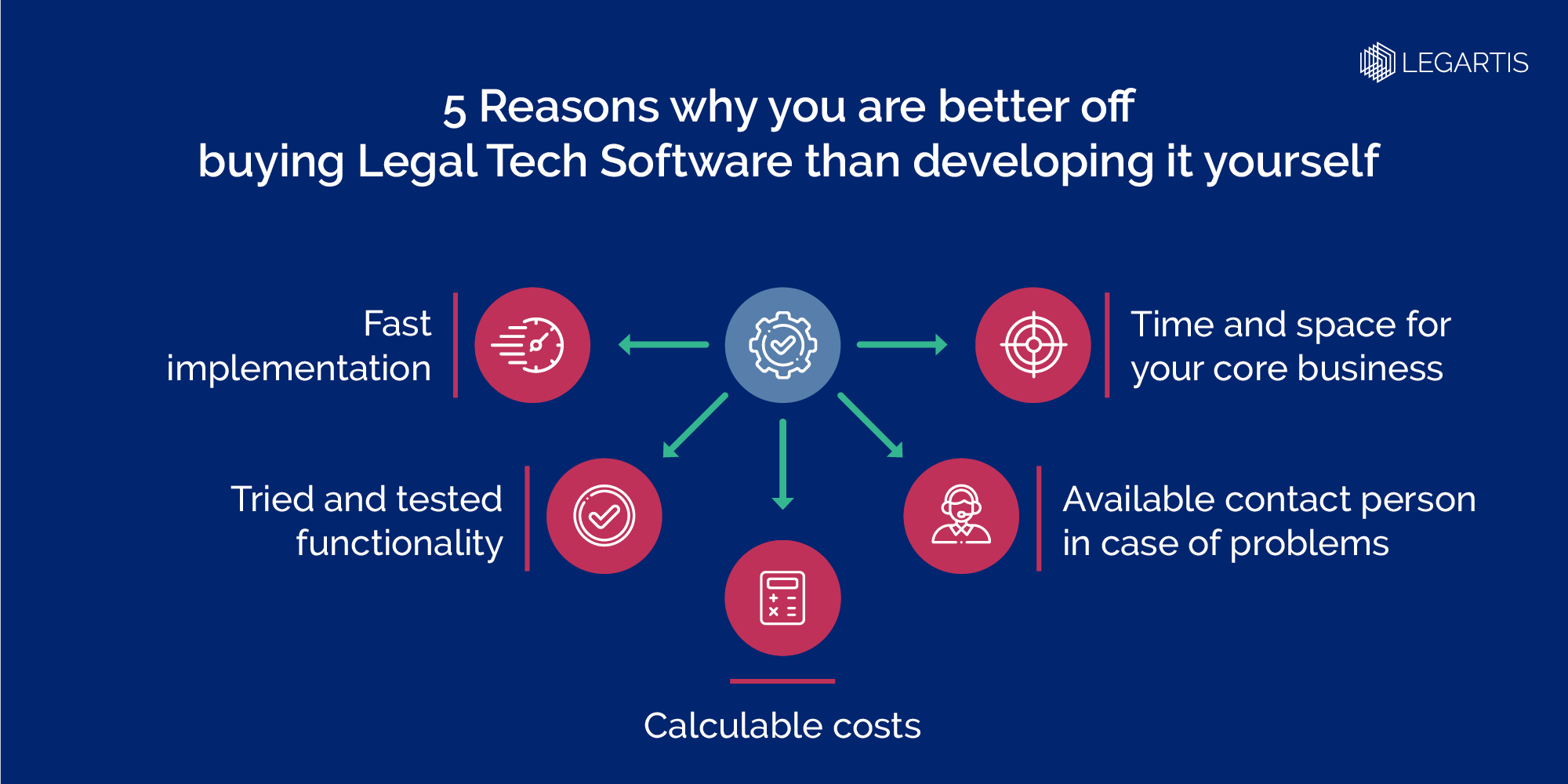Are you planning to digitalise the processes in your legal department with legal software? Then you are facing the question of whether to go for a standard solution or to initiate your own development. We’ll show you what you should consider when making this important decision and if it’s worthwhile investing in tools like automated contract review.
Why is Legal Software Important?
Investing in technology is almost always a good idea. After all, the right technology in the right place can increase your productivity, the accuracy of your work and the efficiency with which you generate results.
Most legal departments have also recognised this: according to a 2021 Gartner study, by 2025 legal teams are expected to spend more and more on legal technology. We are on the verge of a massive technological upheaval in the legal sector, from which no legal department is likely to be exempt.
So the budget for legal software has been approved and is ready to be invested. The only question that remains is: where should legal teams put their money – in developing their own legal software or in buying an existing third-party solution? Which option offers the best ROI? This blog post will answer these questions.
Looking for Legal Software? Ask Yourself These Questions First
You want to use legal software for contracts in your company. That's great! But before you can access the user interface of your brand new and hopefully positively disruptive software for the first time, you have a lot of work to do.
It’s imperative that you do your "homework" conscientiously in advance. Otherwise, you will end up with a software that brings nothing but a big pile of bills. An expensive and unnecessary lesson!
Let's start with a series of essential questions which your legal department should find good answers for:
- Which problem do we want the legal software to solve?
- What is the current manual process for solving the problem?
- What are our requirements for a technology that replaces this manual process?
- Does such technology already exist on the market? Which purchase options do we have?
- Are we able to develop a suitable technology ourselves?
- Who needs to be involved in this decision?
Your answers should have already given you a great deal of clarity. You now know what you need as precisely as possible. You know your available resources and have explored the market.
At this point, your decision between purchase or in-house development may already be obvious. Perhaps because the solution you need does not yet exist. Or because you realise that you do not have the skills to develop an Legal AI programme yourself.
If both options are still available, we’ll next weigh the following decisive factors against each other.
Legal Software – Make or Buy: These are the Factors to Consider
When considering whether to buy contract software for your needs or to programme it yourself, one thing is important: try to look at the whole project. There are two major components of your legal software project:
- Initial development/implementation
- Operation during ongoing business: maintenance and further development
Many companies only identify the initial effort and ignore ongoing business. This can lead to fatal misjudgements.
After all, maintenance will remain on your agenda for as long as you use your legal software – we’re talking about a period of several years. This means significantly more effort than it seems at first.
When we talk about costs, resources and risks, we have to include both components – the initial effort and the necessary ongoing work – in our considerations.
Costs of the Legal Software Project
In-house developments can be very expensive. Additionally, no one knows ahead of time exactly which costs will be incurred. If errors occur later or you want to add new functions, you’ll incur further expenses. You also have to pay administrators or information technicians to keep the system running.
The amount that the purchase of legal software will set you back depends, of course, on the solution in question. There’s a wide range of options, from cheaper standard solutions to innovative best-in-breed solutions. In most cases, the contract already includes the maintenance and further development of the software in the future.
Demand for Time and Human Resources
If you want to build your software yourself, you will need to allocate generous resources to it:
- The development of legal software is probably not your core business. All the tasks associated with it therefore do not fall within your company's area of competence. The necessary staff must first be hired, tools procured and processes established.
- For your company, software development will be new: therefore, everything will take longer and involve more effort. The learning curve will be rather flat at the beginning. Bring patience and time.
- With in-house developments, you may make every mistake and carry out every test yourself. This requires time and personnel.
Buying legal software for contracts is usually far less resource-intensive than developing it yourself. Legal software that is ready for sale has been fully developed and tested many times. You can assume that it will work without much effort.
Of course, it still takes time to integrate a new programme into your workflows. The staff also need to be picked up and trained. However, 1 or 2 project managers are usually sufficient to manage the implementation. The ongoing tasks in the business are often taken over by the provider.
Range of Functions
In terms of range of functions, in-house development has the edge: in-house software can be tailored exactly to your needs. You need a special solution and can’t make any compromises? That's exactly what you’ll get.
Standard industry solutions, however, are hardly inferior. Of course, they don’t fulfil every wish, but on average the solutions surprise with their adaptability. It pays to ask the provider!
Business risk
You’ll have to assume a certain risk with either option. However, the risk is usually higher with in-house developments because you have to bear it yourself completely. It’s impossible to say exactly what’s coming your way until you have the finished solution in your hands: the risk is difficult to calculate. Therefore, a generally high willingness to take risks is a prerequisite for in-house developments.
When you buy a solution, depending on the agreement you’ll have certain requirements. For example, you’ll require repairs if something doesn’t work as promised, or a replacement if damage occurs. This minimises your business risk.
What remains is the risk that you decide on the wrong solution that brings you no real benefit. The only thing that can help here is comprehensive information before you buy and consulting insightful Legal Tech guides.
Quality Control
As a developer, you are solely responsible for ensuring that your legal software is stable and reliable. Do not underestimate the effort involved in quality management at the beginning and during operation.
As a customer of a legal software provider on the other hand, you can largely sit back and let others do the work. Your contractual partner is responsible for quality control.
Conclusion: Purchasing Legal Software is Almost Always the Better Choice
Companies should carefully weigh up whether the effort of in-house development is worth it. Are you willing to take the risk and invest in your development over an unpredictable period of time with no guarantee of a satisfactory outcome? Often the answer is no.
In most cases, a best-in-breed solution like automated contract review from Legartis makes more sense for legal teams. Your focus can remain on your core competence, while you have access to a knowledgeable contact person for all questions related to the legal software.

5 Reasons why you are better off buying Legal Tech Software than developing it yourself
- Fast implementation
- Tried and tested functionality
- Calculable costs
- Time and space for your core business and sales
- Available contact person in case of problems
Legal Software: 3 Key Takeaways
- Legal software is an essential step on the path to becoming a digitalized legal department. To decide whether the budget is best spent on an internal development or an external provider, companies need to conduct a detailed analysis of their own resources and the market.
- A legal software project ties up large amounts of resources during and after the initial implementation. It’s an unpredictable project outside the company's own competence zone. Only special circumstances (e.g. irrefutable requirements for the range of functions) justify the risk of in-house development.
- Companies should weigh all the relevant factors carefully and, if in doubt, opt for a best-in-breed solution that has already been tried and tested. Here, the advantages outweigh the disadvantages and the cost-benefit ratio is usually positive.
Recommended Articles
Agentic AI: Automated Generated Contract Playbooks
Every day, countless agreements are drafted, negotiated, and signed. For legal departments, legal-ops teams, and procurement leads, it is essential to keep track: Which..



